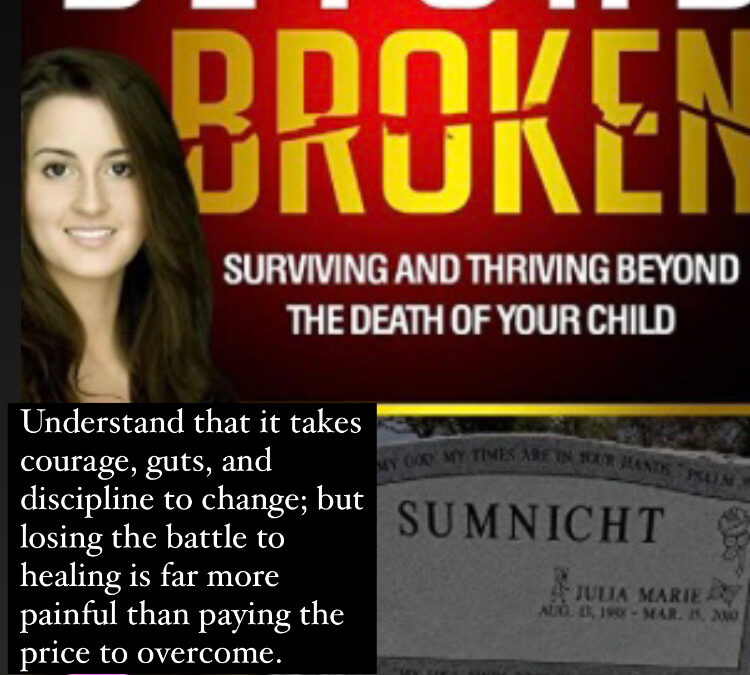People often commented on how “strong” I was in the months following my daughter’s death. Just weeks after Julia died, one of the cards I received was from a woman who wrote that I was going to be “such a testimony”. I stared at her words in disbelief and anger. How dare someone expect me to be a light for Christ when all I could feel was God’s judgment and fear in my heart. She had no idea of what I was going through – emotionally, mentally, spiritually. Why do some people seem to have “all the luck” of going through trials and coming out on the other end stronger and wiser? Is it because they had more support from other people or the right resources? Is it because they were born with the right genes and temperament that enabled them to handle their situation differently? Is it because they really didn’t have it that bad? I believe there are specific reasons why some people navigate hardship and trauma better than others.
One reason people are able to overcome grief is because they come to what I call the “enough” stage. After the loss of my daughter, I allowed my emotions to drive me. “As I unwillingly dragged my body out of bed, the cruel reminder of death and loss gripped my mind and heart. I walked down the hall, past Julia’s closed door, down the steps and headed for the coffee pot. As I sipped my coffee, I opened my Bible to the page where I left off from the morning before, determined to understand God, life and death. What kind of God would allow Julia’s death?” After five years of living in despondency, I finally had enough of the way I was living and feeling. “My usual upbeat nature had been severely tested, and I was done being defeated by negative emotions. Noticing the effects of personal growth habits since September 2015, I made a New Year’s resolution on January 1, 2016, to focus on self-development. I found that just as daily training improved my running, consistent habits led to a positive mindset.” (Beyond Broken)
People who navigate hardship the best make the decision not to live as a victim. It’s very easy, and often justifiable, to rationalize why you “have the right” to feel the way you do. After looking into my daughter’s death investigation, my investigator told me, “Marie, you’ve been victimized twice. First by the perpetrators and then by a police department.” It took me some time to process this statement, but I knew he was right. After the police left our home to tell us they had “found our daughter’s body”, I looked at my husband and said, “Whatever happens, we can’t blame each other.” I’m glad I said that out loud because it later stopped me from blaming him. When you blame or create excuses, it ends up hurting you more than anyone.. When you live as a victim, you give power to the perpetrator and give up your power to change.
Lastly, people who navigate trauma well cling to their values and principles in the midst of confusion and darkness. “Just weeks after Julia’s death, my deep-rooted values motivated me to finish the school year with my students rather than stay home in grief. Although I was still in shock with little emotion, “I cared deeply about not being there with the students I had invested in and loved.” (Beyond Broken) As the years went by, even in the pain and darkness, I never stopped believing that God had a reason for Julia’s death. Initially, the thoughts I told myself daily kept me in a cycle of defeat and bad feelings. I discovered that I was guarding my wrong beliefs because I felt I deserved my pain. Many bereaved parents will say, “If only I had done…” thinking that there must have been something they did or didn’t do that could have prevented their death. Ultimately, my belief in eternal life was confirmed. I knew that God wouldn’t have given me Julia for such a short time and then taken her life at such a young age.
In closing, I’d like to share some “life truths” from my book.
“I learned that life’s most powerful truths are found in adversity.”
“Back then, I’d felt as if I‘d had both feet in heaven and asked God to keep one of my feet firmly planted there. It was a foreign, yet good feeling to be at peace with death.”
“I saw the power of daily intentions as I experienced personal growth and true change.” “Before I could change for the better, I had to be willing to disrupt my thinking.”
“You will believe that you have every right to be angry, to live in pain, and to shut out the world, but don’t you also have the right to find peace, be free of pain, and to have relationships?”
“ Understand that it takes courage, guts, and discipline to change; but losing the battle to healing is far more painful than paying the price to overcome.”
“The beauty in spiritual brokenness is found where it brings us. Brokenness brings humility and openness to all that God has for your life.
With love,
Beyond Broken

 Navigating Hardship and Trauma
Navigating Hardship and Trauma
